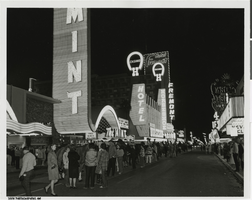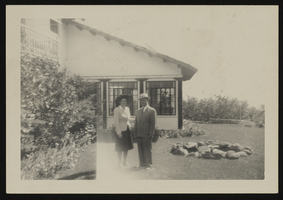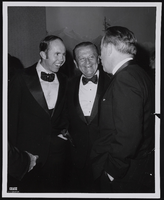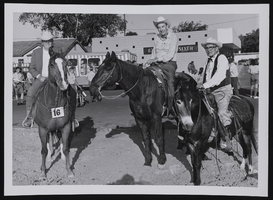Search the Special Collections and Archives Portal
Search Results

Transcript of interview with Daryl Morris by Barbara Tabach, February 16, 2016
Date
Archival Collection
Description
Daryl Morris discusses growing up in Las Vegas and his love of acting.
Daryl Morris is a native of Las Vegas. Born in 1961, he is one of three sons born to Paula and Bobby Morris. He recalls his childhood of the 1960s and 1970s with great fondness of the fast friendships formed within the Jewish community. His day job is in insurance, but his great love is for acting. He tells of being smitten at the age of 11 and taking acting lessons as a youngster and then later studying with actor Jeff Goldblum. He has an impressive list of films in which he has appeared, including the opening scene of Mall Cop 2. He enjoys voice-over acting and teaching acting classes. He also tells about his Navy service, attending UNLV, and coming to settle in Las Vegas-the place he calls home. Daryl also participated in the January 31, 2016, Growing Up Jewish in Las Vegas panel discussion for the Southern Nevada Jewish Heritage Project.
Text

Transcript of roundtable interview about Kristallnacht with Esther Finder, Raymonde Fiol, Alexander Kuechel, Philipp Meinecke and Rabbi Felipe Goodman, by Barbara Tabach, March 17, 2015
Date
Archival Collection
Description
In this interview, the participants discuss their experiences during Kristallnacht, and the commemoration events in southern Nevada with Holocaust survivors and their families. Mr. Kuechel recounts his journey through concentration camps and being liberated by the Russians. Rabbi Goodman talks about meeting Mr. Meinecke, whose grandfather was a high-ranking SS officer. Meinecke discusses his upbringing in Germany and trying to learn about his family's involvement in the Holocaust, and the hope he felt after the fall of the Berlin Wall as Jews returned to Germany. The group discusses the importance of Holocaust education because there are still so many untold stories.
On November 9th to November 10th, 1938, in an incident known as Kristallnacht, Nazis in Germany torched synagogues, vandalized Jewish homes, schools and businesses, and killed close to one hundred Jews. In the aftermath of Kristallnacht, also called the Night of Broken Glass, some thirty thousand Jewish men were arrested and sent to Nazi concentration camps. German Jews had been subjected to repressive policies since 1933 when Nazi Party leader Adolph Hitler became chancellor of Germany. However, prior to Kristallnacht these Nazi policies had been primarily nonviolent. However, after Kristallnacht conditions for German Jews grew increasingly worse. During World War II, Hitler and the Nazis implemented their so-called final solution to what they referred to as "the Jewish problem" and carried out the systematic murder of some six million European Jews in what is now commonly known as the Holocaust.
Text

Transcript of interview with Jim Marsh by Claytee D. White, June 5, 2012
Date
Archival Collection
Description
Jim Marsh in Denver, Colorado. Father was the chief for the Colorado Patrol. Mother lived in Nebraska. Jim split time in both places while growing up. He was a service member of the Army and once getting out of the service he started his work with his father at a Ford dealership. Jim went on to work and own dealership in several different areas, Colorado, California, New Mexico, and Washington states before arriving in Las Vegas, NV in 1971. Once arriving in Las Vegas Marsh purchased a dealership called American Auto Mart. Around 1976 Jim Marsh bought the Santa Fe Saloon along with the twenty lots surrounding it for 12,500. This was his first experience in the gaming industry Marsh was the only dealership in the world for 25 years to have a gaming license in a new-car dealership. Marsh discovered interest in Belmont when there was a lone resident Rose Walter. The two bartered and Jim gained land in Belmont and went on to build a bar and church for the town. Marsh eventually went on to own the Skyline Casino. Jim Marsh founded the Nevada Auto Auction in 1987 on Las Vegas Boulevard South Eventually sold it and used the investment to build the Longstreet Casino. Marsh was' also a member of business organizations, Better Business Bureau and The Red Cross Marsh has been a member of the Salvation Army Advisory Board for at least 25 years. Tonopah is another location that Marsh has invested in. After leasing the gaming at the Mizpah Hotel to later buying the Valley Bank building and moving the gaming from Mizpah. It is still successful today. He also purchased the Tonopah Station House which is a hotel bar, and restaurant; along with owning the grocery store Scolari's next-door. Tonopah has proved to be a very good investment for Jim Marsh.
Text

Transcript of interview with Ernest Clary by Tom Mattingly, February 10, 1979
Date
Archival Collection
Description
On February 10, 1979, collector Tom Mattingly interviewed his neighbor, professional engineer geologist and registered surveyor, Ernest Henry Clary (born May 21st, 1906 in Lincoln, Nebraska) in the collector’s home in Las Vegas, Nevada. The interview covers Mr. Clary’s personal and professional life and the history of Nevada, including, the early above-ground atomic tests, presidential visits and the crash of Carole Lombard’s plane. All persons present during the interview, include: Tom Mattingly, Ernest Clary, Mary Mattingly, and Matt Mattingly.
Text

Interview of transcript with Pamela and Stephen Grogan by Barbara Tabach, June 30, 2014
Date
Archival Collection
Description
Pamela and Steve Grogan met via Match-dot-com and married in 2004. They purchased a house in Scotch 80s with its own colorful history and enough storage for Pam’s extensive collections of cookbooks and cooking supplies. In Scotch 80s Pam has made a name for herself as a cook and hostess, and Steve serves as president of the Scotch 80s Owners Association. In this interview, the couple discuss their house, their neighborhood, urban pressures, and methods of maintaining atmosphere and traffic flow in a neighborhood they have grown to love. Pam moved to Las Vegas from Lockport, Illinois, with some friends in 1999. She had sparked her passion for cooking and cookbooks in Illinois, and in Las Vegas she developed both interests further when she began working as assistant manager for Sur La Table cooking store on the Las Vegas Strip. Steve became interested in Las Vegas after he advised the campaign committee to pass legalized gambling in Colorado and became the first executive director of the Colorado Gaming Owners Association. He left Denver for Las Vegas in 1989 after pursuing successful political and entrepreneurial careers in his former city.
Text

Transcript of interview with Gus Mancuso by Lisa Gioia-Acres, September 27, 2008
Date
Archival Collection
Description
Text

Photograph of a quarter horse sale on Fremont Street (Las Vegas), April 17, 1968
Date
Archival Collection
Description
Horse sale on Fremont Street at night, showing the neon of the Mint, Horseshoe, and Hotel Fremont, all of which make up part of Glitter Gulch. Stamped on original: "Allen Photographers, Inc. Post Office Box 4253 Las Vegas, Nevada 89106."
Site Name: Fremont Street
Address: Fremont street, Las Vegas, NV
Image

Photograph of Teddy Jane and Benny Binion standing in front of their house, Las Vegas, Nevada
Date
Archival Collection
Description
A photograph of Teddy Jane and Benny Binion standing in front of their house, Las Vegas, Nevada in August of 1943.
Image

Photograph of Binion, Cannon, and another man smiling, Las Vegas, Nevada, 1970 to 1979
Date
Archival Collection
Description
Image

Photograph of Binion and two others on horseback, Las Vegas, Nevada, 1960 to 1969
Date
Archival Collection
Description
Image
